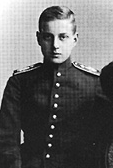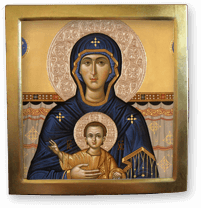Biographies - Grand Duke Dmitri Pavlovich
Grand Duke Dmitri Pavlovich
 Dmitri Pavlovich was one of the few Romanov Grand Dukes to survive the Revolution. His son and grandchildren will be able to see the restored Alexander Palace, a true rarity among the Palace's 20th century residents. Ironically, he survived because of his involvement in the plot to murder Rasputin. Sent in disgrace by Nicholas to join an Army unit in Persia after the murder, Dmitri later escaped to England, and from there to the United States. He is the only later resident whose son has achieved political success.
Dmitri Pavlovich was one of the few Romanov Grand Dukes to survive the Revolution. His son and grandchildren will be able to see the restored Alexander Palace, a true rarity among the Palace's 20th century residents. Ironically, he survived because of his involvement in the plot to murder Rasputin. Sent in disgrace by Nicholas to join an Army unit in Persia after the murder, Dmitri later escaped to England, and from there to the United States. He is the only later resident whose son has achieved political success.Dmitri left no memoirs. The only information we have of him is personal recollections and second hand accounts of his activities. We can see him among the many photographs left behind by the Imperial Family. He can be seen in film footage escorting his cousin, Anastasia, during the dynasty's tercentennial celebrations in 1913. He gave the impression of being a carefree, bon-vivant Grand Duke for much of his life. Impressions can be deceiving, though. His actions, at least at certain times in his life, reveal a much more purposeful and complex human being than he wanted the world to see.
Childhood
Dmitri Pavlovich Romanov, Grand Duke of Russia, was born in 1891, the only son of Princess Alexandra of Greece and Grand Duke Paul (or Pavl) Alexandrovich. The beginning of Dmitri's unstable childhood can be traced to the death of his mother in childbirth. He was afforded the material splendor of a Russian Grand Duke and the emotional poverty of a motherless child. His widower father, brother of Alexander III, and uncle to Nicholas II, became entangled in the matrimonial scandals that plagued the later Romanovs. He and his older sister, Marie Pavlovna. then became part of the household of his aunt and uncle, Grand Duke Sergey and Grand Duchess Elizabeth. These two were an interesting couple: Sergey was the sadistic, anti-Semitic governor-general of Moscow, while Elizabeth, or Ella, later became a nun. Ella and Serguey had no children of their own, likely due to Sergey's reputed homosexuality. Because no one else was available to him, and because she was a loving person, Dmitri got whatever nurturing he could from Grand Duchess Ella. They were to remain close throughout her life.
Dmitri's father, the kindly Grand Duke Paul, was often absent during his son's childhood, due to the afore mentioned matrimonial difficulties. Paul greatly distressed his family when, in 1902, he married a commoner and a divorcee, Olga Karnovich, with whom he had three children. For a time, Paul Alexandrovich was exiled to Paris, returning to his home in Tsarskoe Selo during World War I, at the command of the Tsar. His wife was eventually granted the courtesy title Princess Paley, and died in 1929. In a sense, Dmitri was orphaned twice over, due to Paulês absence and the unlikely possibility that Sergei had any paterna influence over the young Dmitri. It is uncertain if this vacuum was ever filled. If it was, the only possibility is his first cousin, Nicholas II. While their fathers were brothers, the Tsar was 23 years his senior. We can only speculate that, because he often lived in the Alexander Palace and other Imperial residences with Nicholas and his family, Dmitri may have been like a son to the last Tsar.
The premature deaths of those associated with him, beginning with his mother, continued. In 1905, Sergey fell victim to a bomb thrown by revolutionary terrorists led by Boris Savinkov. Ella became a nun, founding a convent in Moscow. She lived in relative obscurity, and makes appearances on the historic canvass only twice more. In 1916, she appealed to her sister, the Tsarina, to send Rasputin away. They parted, for the last time, acrimoniously. In July 1918, one day after the murder of the Imperial Family, the nun was thrown, along with other Romanovs, alive down a mine shaft in Alapayevsk, in Siberia. Her body was discovered by the Whites in the Civil War, and transported to Jerusalem, where she was buried.
The chief difficulty of any child who has known this type of upheaval is in the forming of close attachments with others. It would be easy to be blinded by the material privilege he enjoyed. However, no amount of wealth can make up for a childhood where the young person has every important figure in his life disappear, and frequently through violent means. To survive, Dmitri had to become almost numb regarding death, and that phenomena led to his difficulties as a young man.
Young Adulthood
Nicholas and Aleksandra were very fond of young Dmitri. In fact, evidence exists that they wanted him to marry their eldest daughter, Olga Nickolaevna, and pass on the throne to them jointly, in the likely event Aleksey did not survive childhood. The willingness of Nicholas to tamper with the order of succession is well documented. In fact, his 1917 abdication on behalf of Aleksey was illegal under existing law.
The impediment to implementing this alternate succession plan was not Dmitri, but Olga. We know she was serious and very religious. By then, Dmitri had grown up, but not matured. While Olga and her sisters are frequently characterized as immature, her refusal could be evidence to the contrary. His love of high living and comparatively loose ways very likely shocked the more straight-laced Olga. They were first cousins, once removed, a connection she may have felt was not healthy for any children they would have together. As the daughter of two deeply in love individuals, she may have wished for the same for her marriage. Regardless of her reasoning, we do know that Olga was steadfast in her refusal to enter into a dynastic marriage. She also refused the of suits her cousin Boris Vladimirovich and Prince Carol of Romania.
Olga's refusal did not estrange him from his Imperial cousins. He continued to flirt with the other Grand Duchesses and enjoyed a high degree of intimacy with the Family. Aleksandra, in her diaries, despaired of his involvement with a fast social set. All of these indicate a great closeness, at least on the part of Nicholas and Aleksandra. With his likely difficulties in forming attachments, what were his feelings toward them in 1916?
There are many unanswered questions regarding his involvement in the plot to kill Rasputin. We do know he swore to his father on a cross that he did not kill Rasputin. This agrees with the published accounts by Yussupov of the murder. It is unlikely that Dmitri was ignorant of the Tsarevich's medical condition. If Rasputin's involvement with the Family was as a healer or spiritual advisor, it would also be unlikely that Dmitri, or any of the others associated with the plot, would have sought to kill him.
If Dmitri was the carefree person he portrayed in public, we must ask ourselves, why involve himself in a murder plot? Involve himself, he did. The conspirators were thus shielded from the law, as Grand Dukes were answerable only to the Tsar for their actions. Dmitri, then, reveals himself as more purposeful than his image. But, what was his purpose?
History shows, Rasputin ventured out of the narrow confines that would have made his association with the Imperial couple acceptable. He sought, and obtained, political influence, at least with Aleksandra. There are two theories, both compelling, which could explain Dmitri's motives. The one put forth by Yussupov is that Rasputin was murdered out of Russian patriotism. They thought that, with Rasputin dead, the Tsar could reclaim his slipping prestige. While it seems foolish in hindsight, this motive is possible concerning Dmitri. His cousin was away commanding his Army, and his wife and children were being smeared almost daily in the tabloids with lurid, if untrue, stories involving Rasputin. Dmitri knew Nicholas well enough to know that he would not listen to the familyês advice. He remained close to Ella, an outspoken Rasputin critic. His cousinês reputation suffering, and with the only mother he had ever known urging Rasputinês removal, (and being rebuffed by her sister, Aleksandra), would that have been sufficient motive for Dmitri?
The other theory, never published, but divulged by Maria Pavlovna after her brother's death, was that Rasputin was preparing to go to the Tsarina with damaging information about the flamboyant Prince. The patriotic motive, she told friends, was a cover for the true reason, and was concocted after the fact. The dead men tell no tales theory does have certain appeal. However, there are several problems with it.
This theory presumes a high degree of loyalty on Dmitri's part to Felix Yussupov. Yet, the two did not remain friends in exile. It has already been established that the type of attachment this would involve was difficult, if not impossible, for Dmitri as a young adult. Second, it assumes that the brilliant Rasputin was foolish enough to sit on information, and extremely damaging information, at that, and do nothing to protect himself. This is entirely at odds with the documented evidence we have that Rasputin destroyed careers with a mere whisper to his Tsarina. Third, a member of the Duma was the third conspirator. Purishkevich had no known connection to the two others except for his desire to remove Rasputin. The weight of logic points to a political motive, rather than a personal one.
The precise political motive may never be known. One may accept what Yussupov wrote as true. But, there is a more interesting one that would fit exactly with what we know about Dmitri. It is known that Dmitri was mentioned as a successor to Nicholas during the Revolution of 1905, and also that there were numerous plots in 1916/1917 to remove the Tsar by members of the Romanov family. Most frequently mentioned in the later plotting was Grand Duke Nicholas Nickolaevich, former Commander-In-Chief. But he refused to join in a palace revolution. It is certainly possible that Rasputin's murder was the opening act of a plot to remove Nicholas and replace him with Dmitri. That would also explain his participation better than the two other theories. However, this is still speculative.
It's not too difficult to imagine the great anger and hurt Nicholas and Aleksandra felt upon learning of Dmitri's betrayal, on whatever level, in December 1916. Not only did they lose Father Gregory, they also lost Dmitri. In punishing him, as has been established, they saved his life. They most certainly knew of this irony before they themselves were murdered.
Later Life
During the Revolution, Dmitri lost his father, who was assassinated by the Bolsheviks at the Fortress of Peter and Paul in January 1919, and thrown into a mass grave. His half brother, Prince Vladimir Paley, was murdered along with his nun-aunt Ella at Alapayevsk the day after the murder of the Imperial Family on July 18, 1918. Since he left no memoirs, it is impossible to know precisely how all this carnage affected the Grand Duke. His diaries, deposited in an American university library, reveal he wrote little about Russia. This fact is often cited as evidence that he cared little for what was happening in his motherland. Instead, it may be evidence of a survivor's mentality, and of a young man who could, to some degree, let go of his past.
Dmitri recognized the claim of Grand Duke Kyril to the non-existent Russian throne during the 1920's. In 1926, Dmitri married American heiress Audrey Emery in Biarritz and procured from his Imperial Majesty the title of Princess Illyinsky for his wife. This could be further evidence of political aspirations on his part. By then, the murder of the Imperial Family was known due to Sokolov's work. The Bolshevik regime under Stalin was not at all secure, in spite of their victory over the Whites in the Civil War. Perhaps Dmitri acted to protect the interests of any children he would have.
The couple divorced when their son, Prince Paul Illyinsky, was 9 years old. The Prince lived to manhood, fathering four children, and is now mayor of Palm Beach, Florida. This American Romanov was naturalized under the name Paul Illyinsky and does not pretend to the throne. However, Prince Pavl Dmitrovich Romanov, great grandson of the Tsar-Liberator, is now recognized by numerous monarchical organizations as the heir to the Russian throne. In Russian history, stranger things have happened. Dmitri lived out the remainder of his life as a socialite and champagne salesman. He died in Davos, Switzerland, of tuberculosis, in 1941, at the age of 50. Nicholas II, the cousin he betrayed, also was 50 years old upon his murder. That irony was likely not lost on the outwardly dashing, but, inwardly complex human being, who was Grand Duke Dmitri.
This biography was written by Lisa Davidson
E-mail: j.l.davidson@worldnet.att.com





 Imperial Bedroom
Imperial Bedroom Portrait Hall
Portrait Hall Mauve Room
Mauve Room Maple Room
Maple Room Aleksey's Bedroom
Aleksey's Bedroom Nicholas's Study
Nicholas's Study Aleksey's Playroom
Aleksey's Playroom Formal Reception
Formal Reception Balcony View
Balcony View Aleksey- Balcony
Aleksey- Balcony Children-Mauve
Children-Mauve Nicholas's Bathroom
Nicholas's Bathroom Alexandra- Mauve
Alexandra- Mauve Nicholas's Reception
Nicholas's Reception Tsarskoe Selo Map
Tsarskoe Selo Map